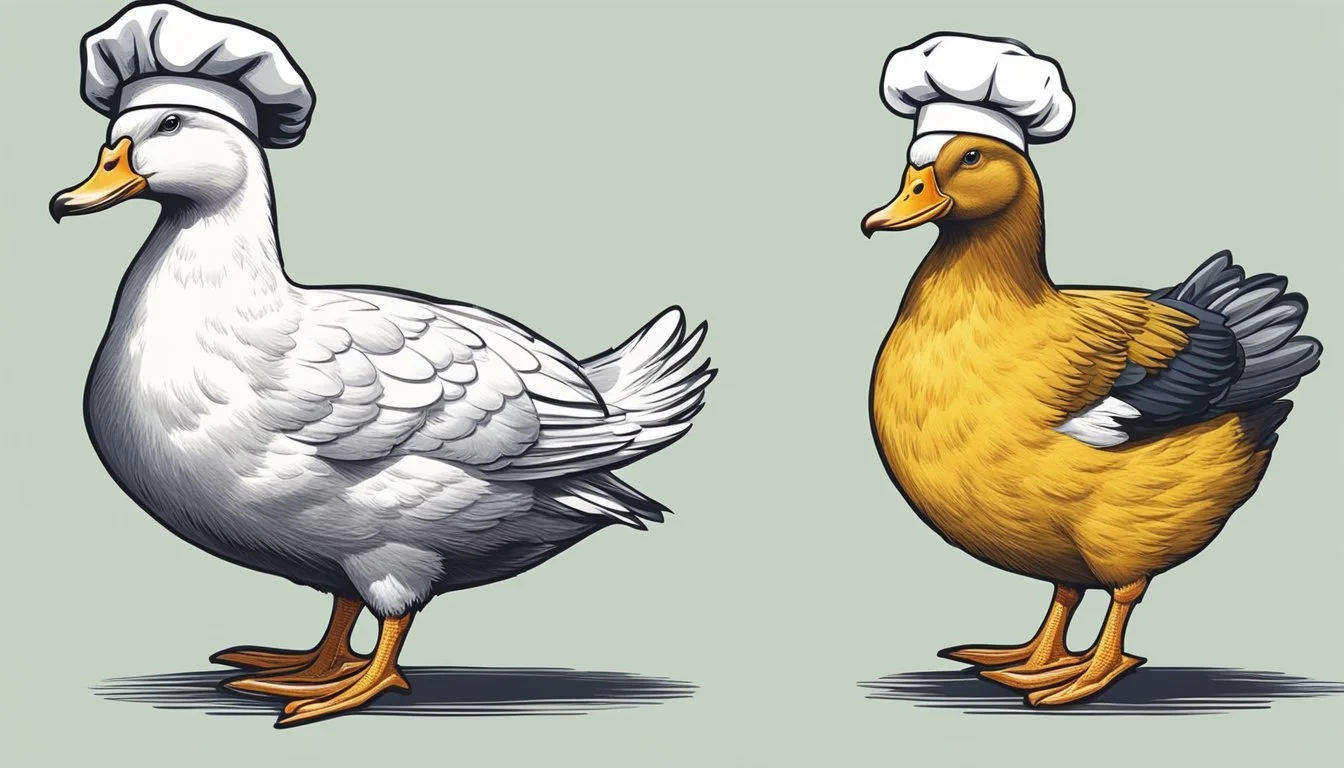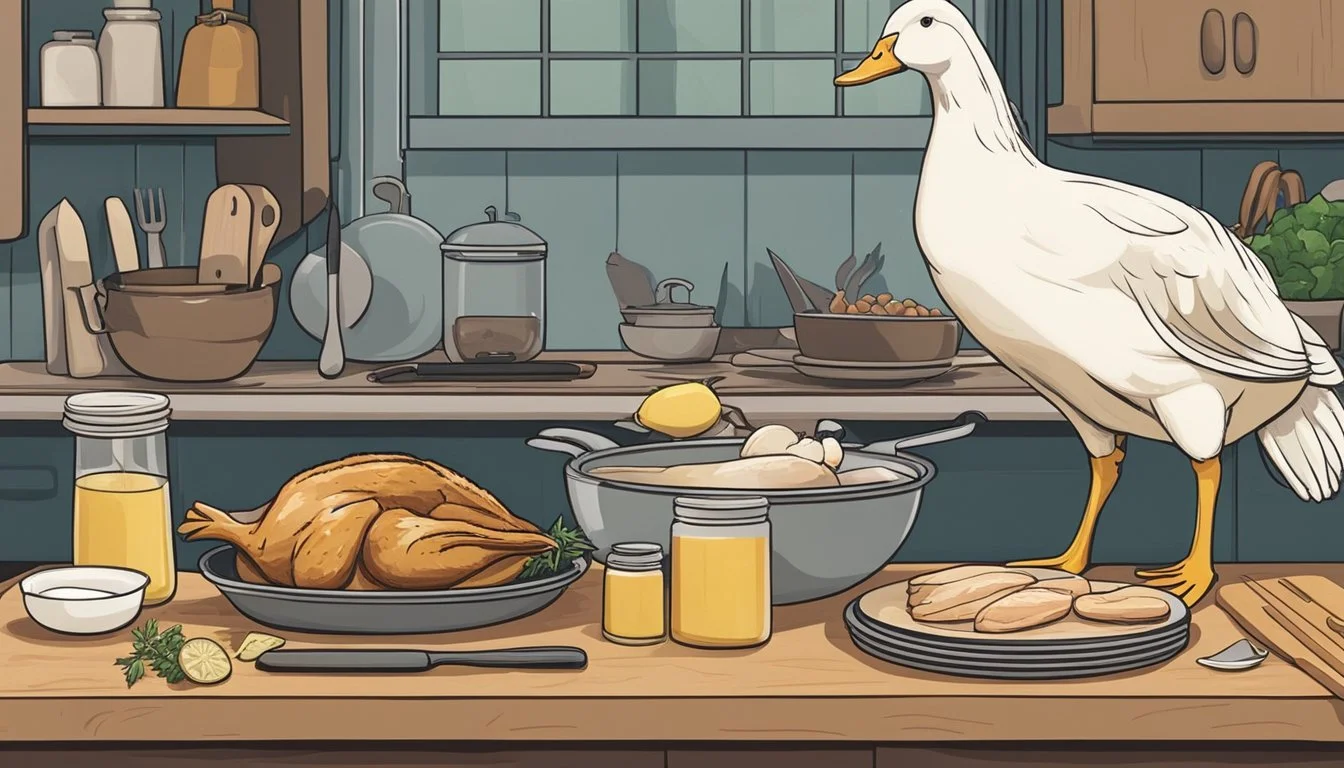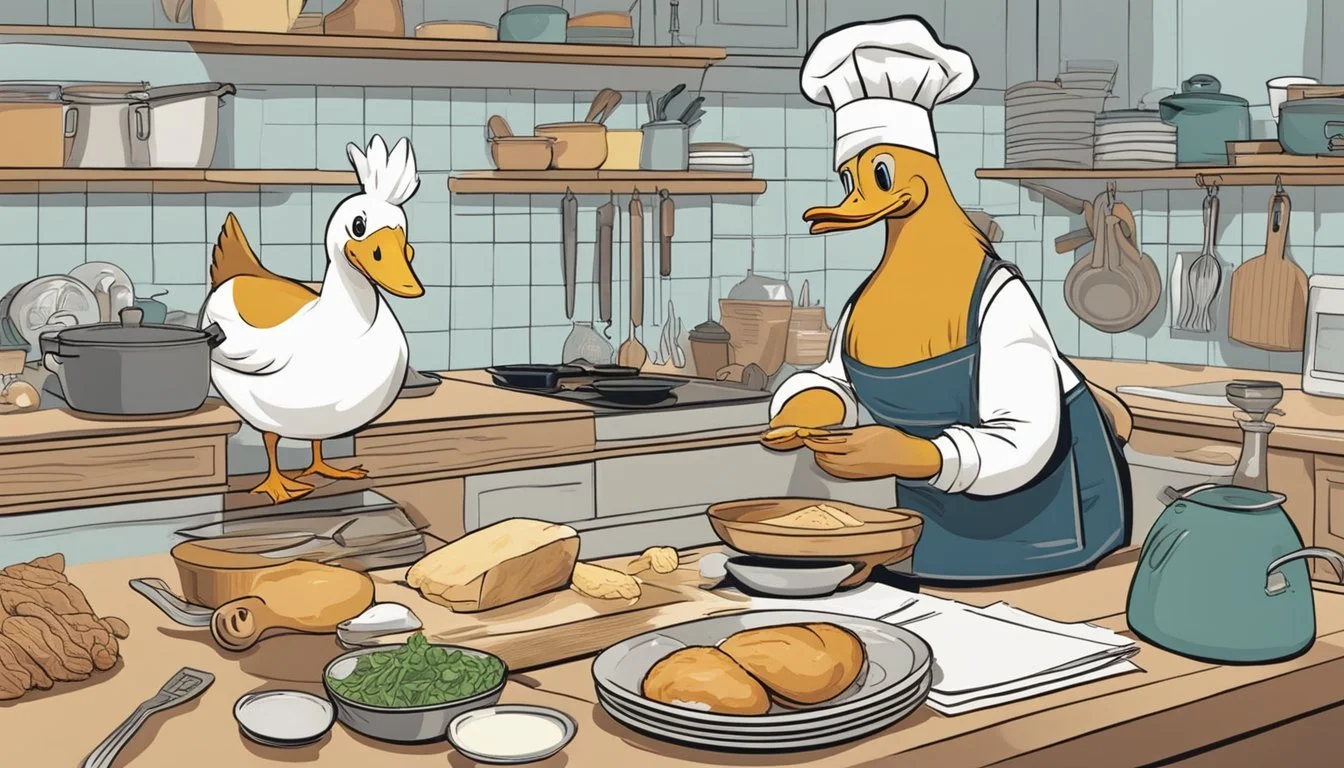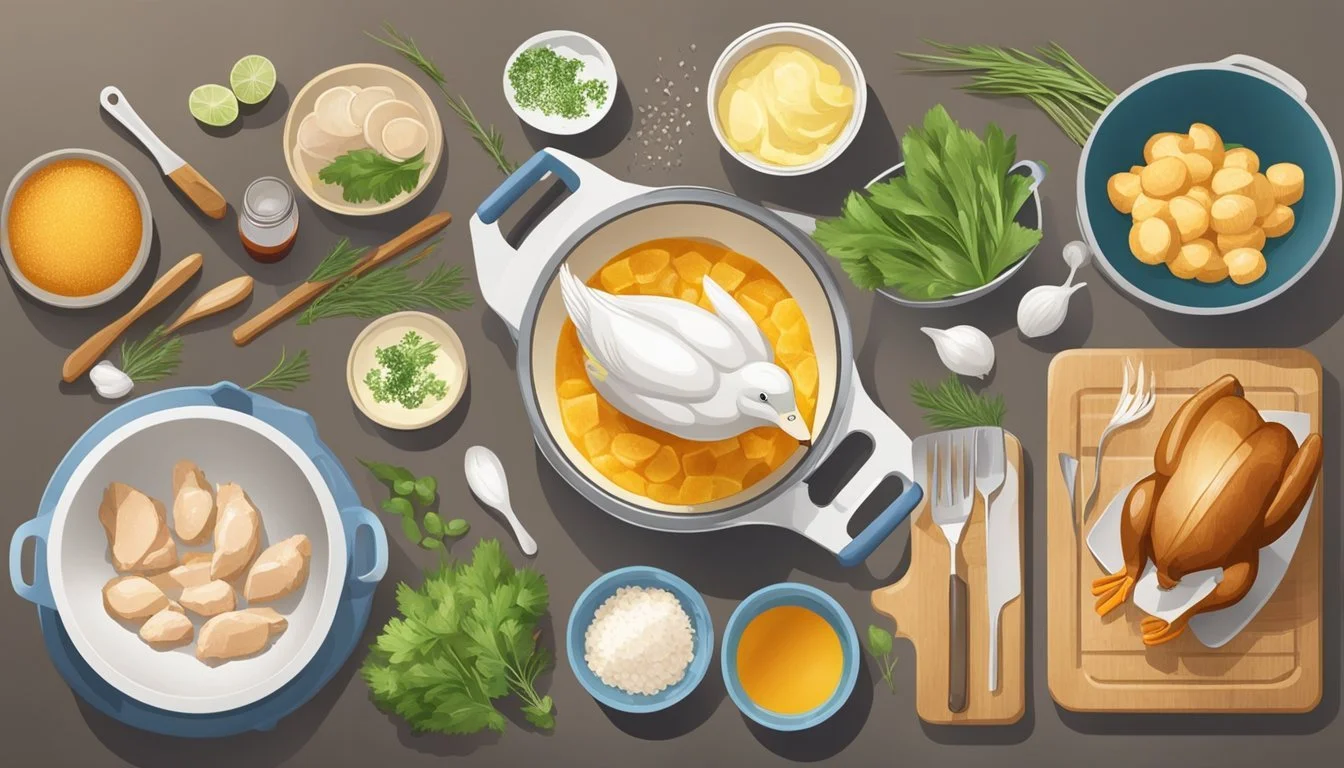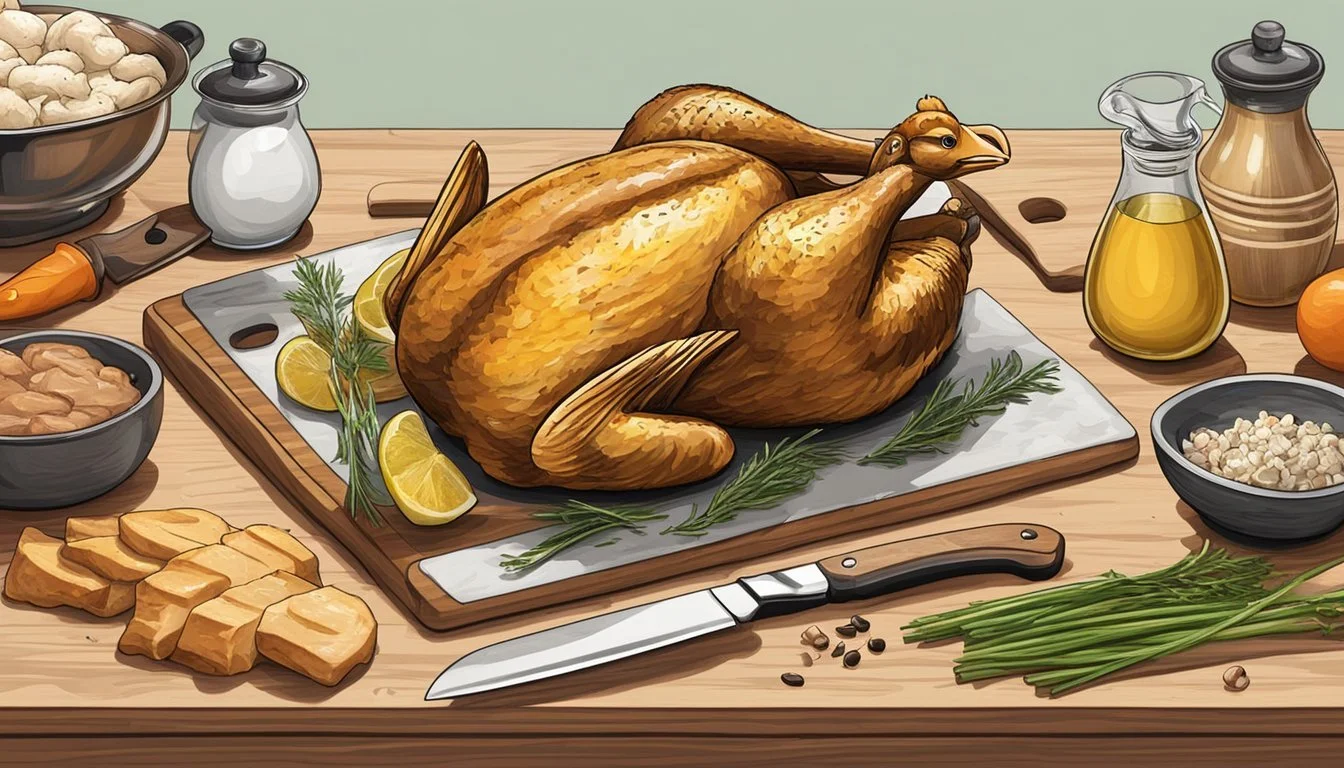How to Substitute Duck for Chicken in Recipes
A Comprehensive Guide
Replacing duck (What wine goes well with duck?) in recipes with chicken (how long does chicken last?) is a common culinary practice, especially when duck is not readily available or if a less fatty and more accessible poultry option is desired. Chicken, being a versatile type of poultry with a milder flavor compared to duck, can be a good alternative in various dishes, from roasts to stews. Since both are popular choices in kitchens around the world, understanding how to successfully substitute chicken for duck in recipes can expand a home cook's repertoire and ensure delicious outcomes despite the switch in proteins.
To effectively substitute chicken for duck, it's essential to consider the differences in flavor and cooking properties between the two birds. Duck is known for its richer, somewhat gamier taste and higher fat content, which contributes to its distinct, luxurious mouthfeel in dishes. Chicken, on the other hand, is leaner and calls for careful cooking to avoid dryness. Cooks often introduce additional fats like duck fat or modify seasoning with more robust spices to mimic duck's flavor profile when using chicken as a substitute.
Cooking techniques may vary when replacing duck with chicken due to their textural differences as well; chicken typically cooks faster and benefits from shorter cooking times to remain tender and juicy. Attention to these details helps maintain the integrity of the original dish, allowing chicken to stand in admirably for duck with minimal compromise on taste and pleasure. By adjusting for these nuances, chicken can be successfully incorporated into a wide range of recipes originally intended for duck, providing a satisfying alternative for diners.
Understanding Poultry Substitutions
When substituting duck for chicken in recipes, one should consider the distinct differences in flavor, texture, nutrition, and size, as these factors will influence the cooking process and the final taste of the dish.
Chicken vs. Duck: Flavor and Texture Differences
Duck meat is known for its rich, robust flavor and fatty skin, which contrasts with the milder taste and leaner build of chicken. Duck tends to have a more pronounced gamey note and a silky texture, due to its layer of subcutaneous fat. In contrast, chicken has a less intense flavor, accommodating a wide variety of seasonings, and a firmer texture, especially in the breast meat.
Nutrition Comparison: Protein, Fat, and Minerals Content
Comparing the nutritional content, both duck and chicken provide high-quality protein necessary for muscle growth and repair.
Fat Content: Duck meat generally has a higher fat content, especially beneath the skin, leading to a richer taste. Chicken is typically leaner, offering less fat per serving.
Protein Content: Chicken breast (What wine goes well with chicken breast?) is a popular choice for high-protein, low-fat diets, but duck meat also offers a considerable amount of protein.
Minerals: Both poultry types are good sources of essential vitamins and minerals such as B vitamins, iron, and zinc, which are important for overall health.
Size Differences and Their Impact on Cooking Time
The size and thickness of the poultry parts being substituted affect the required cooking times.
Chicken: Parts like breasts and thighs are smaller and cook more quickly compared to duck.
Duck: Due to its larger size and higher fat content, duck generally requires longer cooking times to render out fat and achieve a crispy skin.
When substituting duck in a recipe that calls for chicken, adjustments in cooking time and methods will ensure that the dish comes out flavorful and with the desired texture.
Duck Egg Usage in Baking
When incorporating duck eggs into baking, one must consider their larger size and richer content compared to chicken eggs. These factors can affect the texture and structure of baked goods.
Comparing Duck Eggs and Chicken Eggs
Duck eggs outsize chicken eggs by about 30% and have a higher fat and protein content, which contributes to a richer flavor in baking. They often have a thicker shell and the yolks are larger in proportion to the whites, as compared to chicken eggs.
Chicken Eggs Duck Eggs Smaller in size Larger by 30% Less fat and protein More fat and protein Thinner shell Thicker shell Smaller yolks to whites ratio Larger yolks to whites ratio
Substituting Duck Eggs in Baking Recipes
To substitute duck eggs for chicken eggs in a recipe, a general guideline is to use:
Two duck eggs for every three large chicken eggs
Given their larger size and different composition, adjustments in the recipe might be needed to achieve the same result. One needs to reduce the quantity of duck eggs if the recipe specifies a number of chicken eggs.
Achieving Desired Texture and Loft in Baked Goods
The richness of duck eggs provides tender and richer textures in cakes and custards (how long do custards last?). The larger yolks contribute to the moistness, while their whites can create a frothier and fluffier loft, ideal for merengues and other baked goods requiring aerated textures.
To ensure the desired outcome:
Whisk duck egg whites to the required frothiness for merengues.
For cakes, using the exact substitution can result in a denser, more tender cake due to the richness of the duck eggs.
Baked Good Desired Quality Duck Egg Contribution Cakes Tender & moist Larger yolks add richness Merengues Frothy & lofted Whites capable of greater froth Custards Creamy & smooth Richness prevents curdling
Making Substitutions in Recipes
When substituting duck for chicken, understanding the unique characteristics of duck meat and the necessary cooking adjustments are pivotal for the success of the recipe.
Altering Recipes for Duck Meat
Duck meat is richer and fattier than chicken, with a distinct flavor profile that may alter the taste of the dish. If the recipe is robust and flavorful, incorporating duck can enhance its depth. For a milder dish, one may consider how the stronger duck flavor could potentially overshadow other ingredients. In recipes where chicken is the sole protein, turkey (What wine goes well with turkey?) is an appropriate alternative due to its similar texture and flavor properties.
Substitute Ratio for Poultry:
Chicken to Duck: Use equal weight, keeping in mind duck's reduction during cooking due to higher fat content.
Chicken to Turkey (What wine goes well with turkey?): Equal weight substitution is also applicable, taking into account turkey's larger size may require additional seasoning.
Adjusting Cooking Techniques and Times
Duck generally requires a longer cooking time compared to chicken due to its denser texture and higher fat content. It is essential to adapt cooking methods adequately to prevent undercooking or drying out the meat.
Cooking Method Adjustments:
For roasting: Lower the oven temperature and extend the cooking time for duck. Baste regularly to utilize the fat and keep the meat moist.
When pan-frying or grilling: Render the fat from the duck skin first to ensure a crispy finish and to prevent a greasy texture.
Preparation Tips:
To achieve a flavorful outcome, marinate duck meat longer than chicken to penetrate the denser meat.
For fans of tofu or other plant-based substitutes, ensure it's pressed and well-seasoned to match the desired flavor profile.
In each case, modifying cooking times, temperatures, and techniques is key to ensuring substitutes are as delicious and satisfying as the original recipe ingredient.
Considerations for Ingredient Variants
When substituting duck for chicken in recipes, chefs must give consideration to the type of duck products used, how duck fat can be utilized as a substitute for other fats, and the impact of using duck eggs, especially in the context of dietary restrictions.
Selecting the Right Duck Products
Duck Meat: While both duck and chicken are poultry, duck meat is often richer and fattier than chicken. Hence, when choosing duck products as a substitute for chicken, opt for leaner cuts to achieve a comparable texture and flavor. For instance, duck breasts can mimic the experience of chicken breasts if the skin is removed, and the meat is cooked to avoid excess fat.
Using Duck Fat in Place of Other Fats
Fat Content: Duck fat is a culinary favorite for its rich flavor and versatility. When substituting duck fat for fats called for in chicken recipes, consider the following:
Substitute Ratio to Duck Fat Texture Flavor Butter 1:1 Similar Richer, more buttery Olive Oil 0.8:1 Less viscous Milder and more peppery Vegetable Shortening 1:1 Similar Neutral taste
Duck fat can add a depth of flavor to dishes like confit or roast potatoes, but it's essential to balance it with other ingredients to ensure the final dish is not overly rich.
Impact of Egg Variants on Dietary Restrictions
Duck Eggs vs. Chicken Eggs: Duck eggs have a thicker shell and are larger than chicken eggs, which can lead to adjustments in recipes. They also provide a richer taste due to their higher fat content. This difference in size and composition means that substitutions should be made carefully - typically, one duck egg can replace one large chicken egg. Be mindful when serving to guests with dietary restrictions as duck eggs are less commonly consumed and may not be considered in certain diets.
Additionally, when discussing sustainability, it is noted that both duck products and chicken products have varying impacts. The rise in the popularity of alternative poultry products like duck may lead some to seek out sustainable and responsibly-sourced options.
Shopping and Storage Tips
When substituting duck for chicken in recipes, shoppers must pay attention to where they can purchase duck and how to store it effectively to maintain freshness and quality.
Finding Duck Products at Specialty Markets
One can typically find duck meat at specialty markets and higher-end grocery stores. These establishments often offer a range of duck products, from whole ducks to specific cuts like breasts or legs. When searching for duck, shoppers should look for:
Freshness: The duck should have a clean, not pungent, smell and a supple skin.
Labeling: Opt for products labeled as "free-range" or "organic" if available and desired.
Size Comparisons: A whole duck is larger than a large chicken but yields less meat due to its bone structure and fat content.
Storing Duck and Its Products Properly
Proper storage is crucial for maintaining the quality of duck meat:
Refrigeration: Store duck in the coldest part of the refrigerator, typically at the back and on a lower shelf.
Product Lifespan:
Raw Duck: Keep raw duck refrigerated for 1-2 days.
Cooked Duck: Consume cooked duck within 3 days.
Freezing: Duck can be frozen for longer storage. Whole ducks or parts can be stored frozen for up to 6 months.
Eggs: Duck eggs, which are larger than large chicken eggs, should be stored in the refrigerator and can last longer than chicken eggs due to their thicker shell.
Beyond the Recipe: Additional Uses of Duck in Cooking
Duck meat is appreciated for its richer flavor compared to chicken, and it plays a versatile role in cooking, extending beyond just traditional recipes. The culinary world often embraces duck for its potential in innovative dishes and sustainable practices.
Innovative Culinary Applications for Duck
Chefs often seek out duck to create bold and flavorful dishes that stand out on the menu.
Substitutions: In recipes, duck serves as a flavorful alternative to other meats. Its fat can replace butter or oil, adding a depth of flavor to sautéed vegetables and baked goods.
Confit: Beyond duck confit (What wine goes well with duck confit?), one can use shredded duck meat as a richer substitute in chicken salad or tacos for an unexpected twist.
Sustainable Cooking with Duck
The sustainability of cooking with duck is notable, as utilizing the entire bird can minimize waste.
Broth: One can make a rich broth from bones and scraps, embodying a sustainable cooking approach.
Rendering Fat: Duck fat can be rendered and used to cook a variety of dishes, from potatoes to vegetables, imparting a distinctive flavor while optimizing resources.
Conclusion
When substituting duck for chicken in recipes, one should consider the key differences between the two poultry types. Duck tends to be fattier and with a richer flavor compared to the leaner chicken, which might affect the outcome of some dishes. Nevertheless, the two can often be interchanged in recipes because of their textural and culinary compatibility.
For roasting or grilling:
Chicken is a suitable stand-in for duck when roasted or grilled, maintaining juiciness while being less fatty.
For broths and soups:
Chicken can produce a lighter, cleaner broth in place of the typically richer duck-based versions.
When making the switch from duck to chicken:
Adjust cook times: Chicken generally cooks faster than duck due to less fat.
Alter seasoning: Boost flavors with herbs or spices to mimic the robustness of duck.
Modify fat content: If desired, add a bit of duck fat to chicken to enrich the flavor profile.
Substitutions should retain the integrity of the dish while acknowledging the qualities each bird brings. Chicken proves to be a versatile option, capable of stepping in for duck with tasty results. Chefs may also consider using turkey or even quail (What wine goes well with quail?) for a closer match in richness and texture.
It's important to proceed with a bit of culinary creativity and openness to the subtle variations in taste and texture. Through thoughtful substitutions and a willingness to adjust, home cooks can produce delightful meals with either type of poultry.

